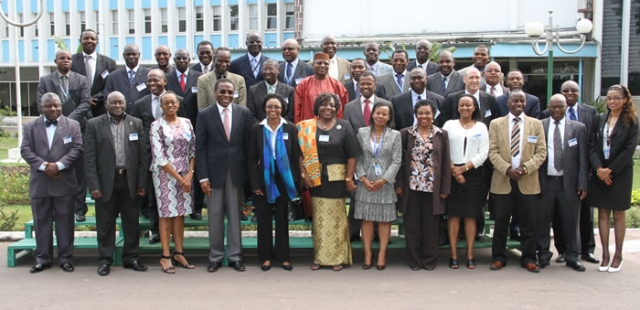62nd Session of WHO AFRO Programme Subcommittee begins in Brazzaville, Congo
 Brazzaville, 9 July 2012 – The 62nd session of the Programme Sub-committee (PSC) of World Health Organization (WHO) in the African region, began today 9 July 2012, in Brazzaville, Congo. The five-day meeting is attended by public health experts from sixteen countries in the African Region and
Brazzaville, 9 July 2012 – The 62nd session of the Programme Sub-committee (PSC) of World Health Organization (WHO) in the African region, began today 9 July 2012, in Brazzaville, Congo. The five-day meeting is attended by public health experts from sixteen countries in the African Region and
Dr Lindiwe Makubalo of South Africa was nominated as Chairperson.
The Committee, which is a subsidiary body of the WHO Regional Committee, will review regional strategies, biennial programme budget, technical reports and resolutions proposed by the Regional Director for consideration by the forthcoming Regional Committee of WHO in the African Region.
In his remarks at the opening session, Dr Luis Sambo, WHO Regional Director for Africa, highlighted the key agenda items to be reviewed by the PSC including health system strengthening, disease control, health promotion as well as health and human rights.
He observed that existing weaknesses in health systems including shortage of skilled human resources in most countries in the African Region is compromising the attainment of national and Millennium Development Goals (MDGs). He noted that following a regional consultation convened in Pretoria, South Africa, in October 2011, with key stakeholders on scaling up the health workforce for improved access to services, a Road map was developed and its implementation is expected to alleviate the human resources for health crisis in countries. He called on delegates to make actionable recommendations on the implementation of the Road map.
Referring to health systems strengthening, the Regional Director stated that both recipient countries and partners are concerned about the inadequacies in global initiatives targeted at specific diseases. He placed emphasis on the need for these initiatives to simultaneously strengthen the capacity of health services to deliver care interventions.
He also underscored the importance of strengthening evidence and health information systems through national health observatories to support ongoing health sector reforms in countries. Dr Sambo pointed out that the African Health Observatory provides an opportunity to strengthen health information systems and research through national health observatories and invited the committee to comment on the actions proposed for implementation.
Regarding disease control, he mentioned that despite progress made, HIV/AIDS is still making a profound impact on people. He said in the light of current developments a new HIV/AIDS strategy for the African Region has been developed and will be submitted to the Regional Committee following a review by the Programme Sub-committee. He also called on the delegates to examine the Disaster Risk management strategy that is being proposed to Member States. The strategy highlights greater focus on managing the risks, not the crisis.
With rising incidence of Noncommunicable diseases (NCDs) in the Africa Region, the Regional Director reminded delegates that these are now high on the global agenda and stressed the need for the Brazzaville Declaration to be endorsed as well as for allocation of adequate resources to address the problem. Citing the Ottawa Charter for Health Promotion and the Rio Political Declaration on Social Determinants of Health, he highlighted the essential role that health promotion plays and requested the delegates to review the new Health Promotion strategy for the African Region which focusses on galvanizing multisectoral actions to promote health across public health problems, programmes and sectors.
Concluding his remarks, the Regional Director referred to the report on Health and human rights. He said challenges in assuring good health as a human right exist in the African Region. Although international treaties that recognize the right to health have been adopted by Member States, they need to be integrated into national frameworks. He reiterated his confidence that the PSC members would use their expertise and experience to review and improve the documents for consideration by Ministers of Health at the Regional Committee (RC62).
_________________________________________________________________
For more information, please contact:
Dr Marion Motari + 4724139910 E-mail: Motarim [at] afro.who.int (Motarim[at]afro[dot]who[dot]int)
C. Boakye-Agyemang + 4724139420 E-mail: Boakyec [at] afro.who.int (Boakyec[at]afro[dot]who[dot]int)


